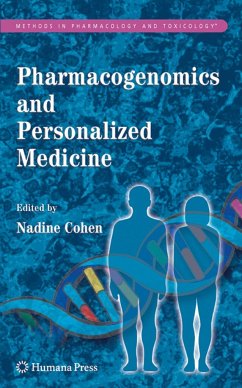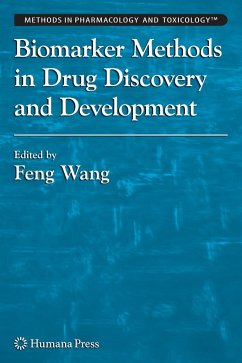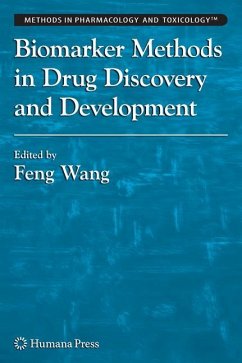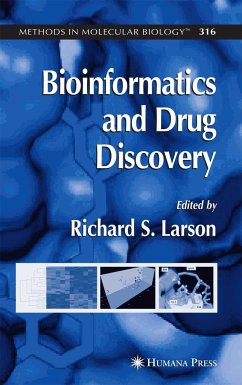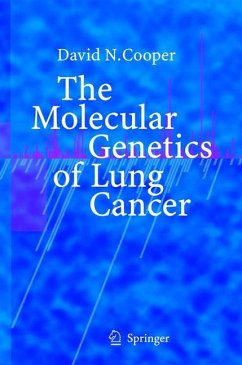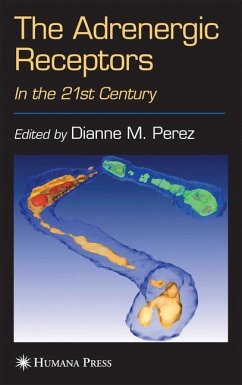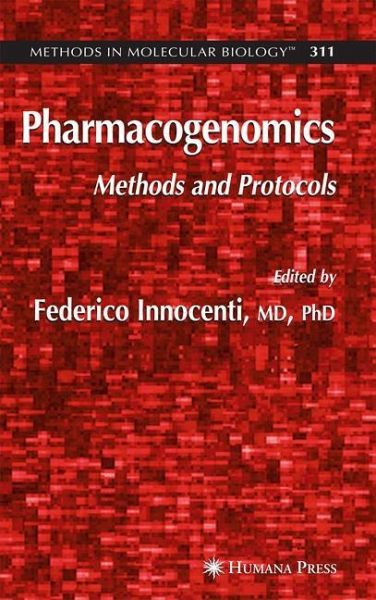
Pharmacogenomics
Methods and Protocols
Herausgegeben: Innocenti, Federico

PAYBACK Punkte
38 °P sammeln!
Expert researchers and physician/clinicians describe in detail the newest and most commonly used technologies today in this rapidly advancing field. The authors provide readily reproducible methods for assessing the functional consequences of a certain polymorphism, evaluate the variety of genotyping platforms currently available, and discuss the management of pharmacogenomic information. Highlights include techniques for making a snapshot of the allele-specific variation in human gene expression, genome wide analysis of allele-specific expression using oligo microarrays, in vivo assays with H...
Expert researchers and physician/clinicians describe in detail the newest and most commonly used technologies today in this rapidly advancing field. The authors provide readily reproducible methods for assessing the functional consequences of a certain polymorphism, evaluate the variety of genotyping platforms currently available, and discuss the management of pharmacogenomic information. Highlights include techniques for making a snapshot of the allele-specific variation in human gene expression, genome wide analysis of allele-specific expression using oligo microarrays, in vivo assays with HaploChIP, SNP genotyping in DNA pools, and PharmGKB, the pharmacogenetics and pharmacogenomics knowledge base. The methodologies for genotyping include denaturing high-performance liquid chromarography, pyrosequencing, kinetic-fluorescence detection, mass spectrometry, and TaqMan assay for insertion/deletions. Pharmacogenomics holds the promise of drugs tailor-made to an individual's geneticmakeup for greater efficacy and safety. In Pharmacogenomics: Methods and Protocols, expert researchers and physician/clinicians describe in detail the newest and most common technologies now used in this rapidly advancing field. The authors provide readily reproducible methods for assessing the functional consequences of a certain polymorphism, evaluate the variety of genotyping platforms currently available, and discuss the management of pharmacogenomic information. Highlights include techniques for making a snapshot of the allele-specific variation in human gene expression, genome wide analysis of allele-specific expression using oligo microarrays, in vivo assays with HaploChIP, SNP genotyping in DNA pools, and PharmGKB, the pharmacogenetics and pharmacogenomics knowledge base. The methodologies for genotyping include denaturing high-performance liquid chromatography, pyrosequencing, kinetic-fluorescence detection, mass spectrometry, and TaqMan assay for insertion/deletions. The protocols follow the successful Methods in Molecular Biology series format, each offering step-by-step laboratory instructions, an introduction outlining the principles behind the technique, lists of the necessary equipment and reagents, and tips on troubleshooting and avoiding known pitfalls.
Comprehensive and highly practical, Pharmacogenomics: Methods and Protocols offers pharmacologists, geneticists, molecular biologists, and clinical chemists working in academia, biotechnology, and the pharmaceutical industry a cutting-edge collection of the key techniques used for today's preclinical and clinical studies.
Comprehensive and highly practical, Pharmacogenomics: Methods and Protocols offers pharmacologists, geneticists, molecular biologists, and clinical chemists working in academia, biotechnology, and the pharmaceutical industry a cutting-edge collection of the key techniques used for today's preclinical and clinical studies.






